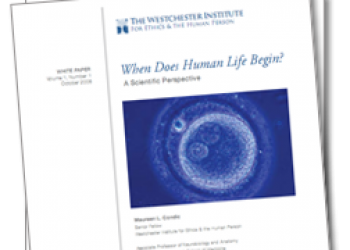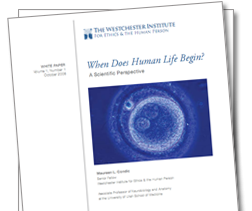
BDF Bioethics Briefings: Science and Policy in the Service of Human Life
- The Origin of Human Life at Sperm-Egg Fusion: Quotes from medical textbooks and peer-reviewed scientific literature – Download a lot 14-page list of quotes from medical textbooks and science journals on the scientific consensus of when human life begins. 12/2021 update compiled by Dr. M.L. Condic, Professor of Neurobiology and Anatomy, University of Utah, School of Medicine.
- Gestational Surrogacy – Learn the policy arguments that expose this practice as a new form of human trafficking, referred to by BDF as “reproductive trafficking.”
- Three-Parent Embryos – Review our Bioethics Briefing including policy arguments and a science paper by Dr. ML Condic regarding this practice which involves human cloning to create genetically modified human babies.
White Paper. Condic, ML. “When Does Human Life Begin?: A Scientific Perspective” (Westchester Institute 2008).
 Resolving the question of when human life begins is critical for advancing a reasoned public policy debate over abortion and human embryo research. This article considers the current scientific evidence in human embryology and addresses two central questions concerning the beginning of life: 1) in the course of sperm-egg interaction, when is a new cell formed that is distinct from either sperm or egg? and 2) is this new cell a new human organism—i.e., a new human being? Based on universally accepted scientific criteria, a new cell, the human zygote, comes into existence at the moment of sperm-egg fusion, an event that occurs in less than a second. Upon formation, the zygote immediately initiates a complex sequence of events that establish the molecular conditions required for continued embryonic development. The behavior of the zygote is radically unlike that of either sperm or egg separately and is characteristic of a human organism. Thus, the scientific evidence supports the conclusion that a zygote is a human organism and that the life of a new human being commences at a scientifically well defined “moment of conception.” This conclusion is objective, consistent with the factual evidence, and independent of any specific ethical, moral, political, or religious view of human life or of human embryos.
Resolving the question of when human life begins is critical for advancing a reasoned public policy debate over abortion and human embryo research. This article considers the current scientific evidence in human embryology and addresses two central questions concerning the beginning of life: 1) in the course of sperm-egg interaction, when is a new cell formed that is distinct from either sperm or egg? and 2) is this new cell a new human organism—i.e., a new human being? Based on universally accepted scientific criteria, a new cell, the human zygote, comes into existence at the moment of sperm-egg fusion, an event that occurs in less than a second. Upon formation, the zygote immediately initiates a complex sequence of events that establish the molecular conditions required for continued embryonic development. The behavior of the zygote is radically unlike that of either sperm or egg separately and is characteristic of a human organism. Thus, the scientific evidence supports the conclusion that a zygote is a human organism and that the life of a new human being commences at a scientifically well defined “moment of conception.” This conclusion is objective, consistent with the factual evidence, and independent of any specific ethical, moral, political, or religious view of human life or of human embryos.
Download the full White Paper (526k pdf)
Stem Cells and Development Journal. “Totipotency: What it is and what it isn’t”
As science progresses in the field of stem cell research, there is considerable confusion, both within the scientific community and in the general public, about what is, and what is not a human embryo. Are stem cells embryos, as some have claimed? Do we need to worry about reprogramming accidentally going “too far” and producing embryos in the laboratory? What about human cloning? What about human twinning? Dr. Maureen Condic addresses these and other important questions in an article entitled: “Totipotency: What it is and what it isn’t,” published in the globally recognized journal Stem Cells and Development.
This is a rigorous scientific analysis by Dr. Condic, a scientist and professor of embryology and neurobiology at the University of Utah School of Medicine, yet it is written in plain language that can be understood by the educated non-scientist. The full paper can be downloaded for free here:
Download the full Paper (416.4k pdf).
- Review a layperson’s version of the article on Public Discourse.
- See other links related to this article here.
White Paper. “The Stem Cell Debates: Lessons for Science and Politics,” A Report of the Witherspoon Council on Ethics and the Integrity of Science
The debates over stem cell research during the last decade have been among the most heated controversies in the history of science — touching on fundamental questions concerning the governance of science and the moral status of embryonic human life.
The entirety of the Winter 2012 issue of The New Atlantis is devoted to a major report on the stem cell debates, a comprehensive and up-to-date account of the scientific facts and the moral, political, and legal stakes. This is the inaugural report of an important new body, the Witherspoon Council on Ethics and the Integrity of Science.
Download the full White Paper (PDF)
White Paper. “Emergency Contraceptives & Catholic Healthcare”
The question of the licitness of providing “emergency contraceptives” to victims of sexual assault who present in the emergency rooms at Catholic hospitals is a critical matter for evaluating and developing appropriate protocols for sexual assault victims. An examination of the available scientific studies demonstrates that the most common emergency contraceptive—Plan B, generally administered to prevent ovulation—at times may fail to prevent conception from taking place and instead may prompt an early abortion. This necessitates answering the question of when, and under what circumstances, it is morally licit to provide contraceptive medications to sexual assault victims while avoiding the potential outcome of prompting an early abortion.
Download the full White Paper (526k pdf)
Reports by The President’s Council on Bioethics (2002-2008)
- Human Cloning and Human Dignity: An Ethical Inquiry
- Beyond Therapy: Biotechnology and the Pursuit of Happiness
- Being Human: Readings from the President’s Council on Bioethics
- Monitoring Stem Cell Research
- Reproduction and Responsibility: The Regulation of New Biotechnologies
- White Paper: Alternative Sources of Human Pluripotent Stem Cells
- Taking Care: Ethical Caregiving in Our Aging Society
- Human Dignity and Bioethics: Essays Commissioned by the President’s Council on Bioethics
- The Changing Moral Focus of Newborn Screening: An Ethical Analysis by the President’s Council on Bioethics
- Controversies in the Determination of Death: A White Paper by the President’s Council on Bioethics

















